Something nice has been happening recently - more people seem to be tuning into tea sites, and compadres from other blogs have been reporting increases in interest that I am happy to say have been echoed here at the creaky old Half Dipper. More people are getting interested in tea, and that's brilliant. Having a bigger crowd of people tuned into good tea is beneficial for absolutely everyone involved.
Our rhubarb.
The rhubarb that I churn out here is mostly transcribed from pen-and-ink journals, and so it can be buried under layers of jargon and other unfriendly material. Jargon itself is necessary, within reason, because it is short-hand. It's much more clunky to write about "the sweet sensation that comes into the mouth and sits in the throat after the swallow" when the word huigan (HWEE-GAN) does the trick in a concise way. As long as we don't go overboard with the jargon (and I'm thinking of typical managerial-style verbiage), a little bit of short-hand can improve the overall readability of an article.
This leads me to a number of e-mails I've had over the past few weeks that have been saying something along the lines of (i) I'm newish to tea and want to explore more, (ii) what's with all the crazy language, (iii) what's a good way to go about enjoying tea?
So I'll briefly deal with these three points in turn. Apologies to the gnarled, wizened tea ninjas in the audience, as this will no doubt sound quite elementary. Maybe you can offer some corrections where you see fit.
This leads me to a number of e-mails I've had over the past few weeks that have been saying something along the lines of (i) I'm newish to tea and want to explore more, (ii) what's with all the crazy language, (iii) what's a good way to go about enjoying tea?
So I'll briefly deal with these three points in turn. Apologies to the gnarled, wizened tea ninjas in the audience, as this will no doubt sound quite elementary. Maybe you can offer some corrections where you see fit.

An amusing photograph in which Heidu sleeps with his head rammed between his hind legs,
right next to his derriere.
(i) I'm newish to tea and want to explore more.
Welcome. Gentle Reader, you have to come to terms with the fact that you are, I'm afraid to say, a bit sad.
Reading and writing about tea, of all things, is actually rather tragic when you look at it from a distance. I came to terms with this some time ago, and can live with it. I try not to tell people about the Half Dipper, and my wife is very sporting by not mentioning it to people. Yes, you can convince yourself that it's like enjoying wine or cheese, and that's very cool, and that you're a connoisseur (awful word), and so forth. Unfortunately, this does not change the fact that what we do here, furtively, behind closed doors, is rather unusual. I think it's brilliant, and very healthy, and great for the development of all manner of personal faculties... but your peers will, in all likelihood, judge you as being as sad individual. What do they know anyway, right? Everyone has their foibles. Etc.
Welcome. Gentle Reader, you have to come to terms with the fact that you are, I'm afraid to say, a bit sad.
Reading and writing about tea, of all things, is actually rather tragic when you look at it from a distance. I came to terms with this some time ago, and can live with it. I try not to tell people about the Half Dipper, and my wife is very sporting by not mentioning it to people. Yes, you can convince yourself that it's like enjoying wine or cheese, and that's very cool, and that you're a connoisseur (awful word), and so forth. Unfortunately, this does not change the fact that what we do here, furtively, behind closed doors, is rather unusual. I think it's brilliant, and very healthy, and great for the development of all manner of personal faculties... but your peers will, in all likelihood, judge you as being as sad individual. What do they know anyway, right? Everyone has their foibles. Etc.
Writing about tea is actually rather sad. Confess!
(ii) What's with all the crazy language?
As above, it's short-hand. I try to make it accessible by quick translations in square brackets, but for extended explanations, I advise you to head towards that lexicographical leviathan, Babelcarp. It will serve you well. (Three cheers for its author, Lew - thanks again on behalf of everyone for an invaluable tool. I use it all the time.)
As above, it's short-hand. I try to make it accessible by quick translations in square brackets, but for extended explanations, I advise you to head towards that lexicographical leviathan, Babelcarp. It will serve you well. (Three cheers for its author, Lew - thanks again on behalf of everyone for an invaluable tool. I use it all the time.)
(iii) What's a good way to go about enjoying tea?
Yikes, that's a big one. It's the equivalent of slyly asking a Zen master, "What is Zen?" It's a trick question, with a venomous tail.
Like the Zenji, I won't answer it directly, because it doesn't have an answer. What I will do is gingerly tiptoe around the subject like the woeful coward that I am, and point the odd random finger at what looks like the moon.
Step 0 is to ignore ab-so-lutely everything out there. Especially from tea blogs. We all think we know the answer, and we all like to pontificate upon our endless, fathomless knowledge for the greater edification of mankind. However, we're really all confidence tricksters. Not one of us has the answer, because there isn't one.
Like the Zenji, I won't answer it directly, because it doesn't have an answer. What I will do is gingerly tiptoe around the subject like the woeful coward that I am, and point the odd random finger at what looks like the moon.
Step 0 is to ignore ab-so-lutely everything out there. Especially from tea blogs. We all think we know the answer, and we all like to pontificate upon our endless, fathomless knowledge for the greater edification of mankind. However, we're really all confidence tricksters. Not one of us has the answer, because there isn't one.
Sure I'm a Zen master. Just feed me catfood when I ask for it.
I can live with the fact that there is no answer. It's actually rather liberating. Just be aware of it when you're reading the latest exposition of how you should be drinking your tea, and how it tells you that your storage method sucks, how your choice of tea sucks, how your method of wiping your teapot sucks, how your cups suck, how you suck, and how everyone in China is laughing at you, Gentle Reader.
They're not laughing at you really. In fact, most people in China don't know their Yiwu from their Wuyi, much like most Westerners couldn't tell a claret from a Beaujolais*.
(*Classic lyric from British indie band, blur. Name that tune!)
There are some good ways to get started. The eternally superb pairing of Tea Nerd and Marshaln's Xanga have recently published articles on simple teaware set-ups for getting into tea. My advice is always: start small. Start inexpensive. Start simple. Tread slowly - you can make decent tea in the simplest of vessels, and don't let teapot salesmen tell you otherwise. Upgrade at your leisure, not theirs, when you have a better feel for what you're up to.
They're not laughing at you really. In fact, most people in China don't know their Yiwu from their Wuyi, much like most Westerners couldn't tell a claret from a Beaujolais*.
(*Classic lyric from British indie band, blur. Name that tune!)
There are some good ways to get started. The eternally superb pairing of Tea Nerd and Marshaln's Xanga have recently published articles on simple teaware set-ups for getting into tea. My advice is always: start small. Start inexpensive. Start simple. Tread slowly - you can make decent tea in the simplest of vessels, and don't let teapot salesmen tell you otherwise. Upgrade at your leisure, not theirs, when you have a better feel for what you're up to.
Health warning: teaware can seriously damage your wallet.
The real crux of the e-mails was hinting at "how should I taste tea?"
Sip it and see what you think!
Though that's fundamentally true, I could put it somewhat less fatuously. What I'll write here is what works for me. This is how I do it, not how you should do it. If you like parts of this approximate description, that's great - but they're just personal preferences. My particular method that has evolved as a function of the way I look at tea, the particular teaware I happen to enjoy using, and so on. Remember, we're just a bunch of charlatans, so take everything you read with a hefty pinch of salt.
I like to use an aroma cup (a.k.a. wenxiangbei - WEN SHEE-ANG BAY). It (i) cools my tea, and (ii) gives me an insight into the content of the tea, complementary to the sensations obtainable from the mouth, in a manner facilitated by the design of the cup.
Sip it and see what you think!
Though that's fundamentally true, I could put it somewhat less fatuously. What I'll write here is what works for me. This is how I do it, not how you should do it. If you like parts of this approximate description, that's great - but they're just personal preferences. My particular method that has evolved as a function of the way I look at tea, the particular teaware I happen to enjoy using, and so on. Remember, we're just a bunch of charlatans, so take everything you read with a hefty pinch of salt.
I like to use an aroma cup (a.k.a. wenxiangbei - WEN SHEE-ANG BAY). It (i) cools my tea, and (ii) gives me an insight into the content of the tea, complementary to the sensations obtainable from the mouth, in a manner facilitated by the design of the cup.
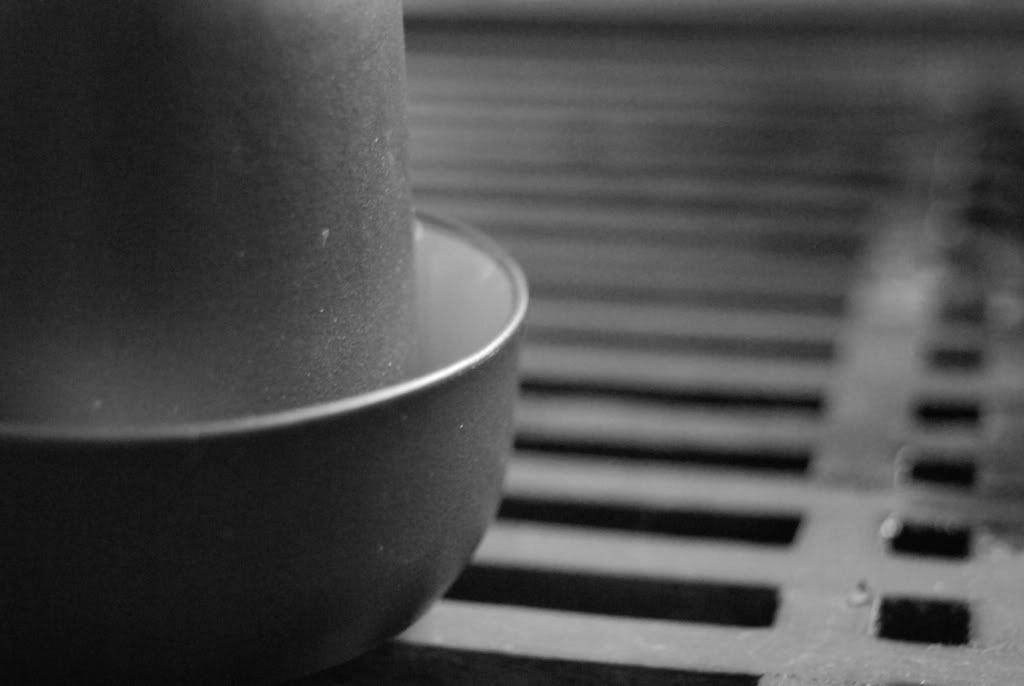
Yes, we know you don't use an aroma cup. Gnnghgh.
When you pour the soup out of the wenxiangbei, you get what perfumers (and modernday biochemists) traditionally term the "top note" or "head note". It's all of the "light" volatile compounds that make it into the nose first - you get lighter, higher notes such as sweetness, floral compounds, etc. Teafolk might call this the beidixiang (BAY DEE SHEE-ANG), lit. cup-bottom scent. Do you get mushrooms? Flowers? Sweetness? If so, what sort of sweetness?
As these disappear, and the "heavier" volatile compounds take over, you get the "bass note" or "body note". Perfumers liken their craft to music, and it's easy to see why. As an engineer, I think in terms of low-frequency spectral content and high-frequency spectral content - it's exactly the same as the audio analogy. (Engineers are great to take to concerti - "oh, listen to the high-frequency components in that section!") This heavier stage consists of deep sugars, richness, lowness, bass notes, that kind of thing. Teafolk might call this the lengxiang (LUNG SHEE-ANG), lit. cool-scent. Molasses? Brown sugar? What do you get at this point?
Sensing of these compounds gives you an indication of the content in various stages of the tea. Often, the aroma correlates with observations made using the mouth, throat, and aftertaste. It can another way to determine what compounds are tucked away inside your tea.
I like the design of the wenxiangbei, as it makes this transition from beidixiang to lengxiang obvious, and concentrates the evaporation in an aperture sufficiently small enough to be filled up by your probing, inquisitive nez. The tall walls of the cup make for a large evaporative surface, and promote rapid cooling. It's a nice bit of engineering, in fact. Evolutionary engineering.
So far, so good. Remember - don't take any of this to heart. This is just loose talk, and you should disregard it in favour of your own empirical observations and use of equipment (grazie, Gautama.)
As these disappear, and the "heavier" volatile compounds take over, you get the "bass note" or "body note". Perfumers liken their craft to music, and it's easy to see why. As an engineer, I think in terms of low-frequency spectral content and high-frequency spectral content - it's exactly the same as the audio analogy. (Engineers are great to take to concerti - "oh, listen to the high-frequency components in that section!") This heavier stage consists of deep sugars, richness, lowness, bass notes, that kind of thing. Teafolk might call this the lengxiang (LUNG SHEE-ANG), lit. cool-scent. Molasses? Brown sugar? What do you get at this point?
Sensing of these compounds gives you an indication of the content in various stages of the tea. Often, the aroma correlates with observations made using the mouth, throat, and aftertaste. It can another way to determine what compounds are tucked away inside your tea.
I like the design of the wenxiangbei, as it makes this transition from beidixiang to lengxiang obvious, and concentrates the evaporation in an aperture sufficiently small enough to be filled up by your probing, inquisitive nez. The tall walls of the cup make for a large evaporative surface, and promote rapid cooling. It's a nice bit of engineering, in fact. Evolutionary engineering.
So far, so good. Remember - don't take any of this to heart. This is just loose talk, and you should disregard it in favour of your own empirical observations and use of equipment (grazie, Gautama.)
Do Buddhist bodyguards break your legs compassionately?
Next up, I drink it. In conventional (hongcha or "black tea") tasting, a taster might spit out the tea. This works if you're just evaluating the mouth- and nose-sensations, as you'd find in familiar Indian tipples. Pu'er, though, has a lot happening after the swallow, and I don't find the spitting approach works too well. Plus, it's less gross. I always get wasted at wine-tastings for this very reason.
Amusing tangent: my brother (one of the coolest cosmologists in this galaxy or any other) is a "keen oenophile", as his biography reads. As such, he spends plenty of time in Napa Valley, and recounts the tale of one very famous producer who was holding a tasting. There were big spittoons on the tables, for obvious reasons. He and his companions (other European scientists) at the time were making use of them, as has become second nature for people that spend enough time knocking back corking Burgundies and other treats. Apparently, the (American) folks gathered around other tables started shooting them black looks. They continued tasting, as discreetly as ever, thinking that the complainers were probably in the wrong place if they didn't like the standard practice for wine-tasting. Ultimately, they were asked to leave by the house for using the spittoons! It seems that the spittoons were just in place for show.
Let's get back to tea-tasting. In the next section.
Amusing tangent: my brother (one of the coolest cosmologists in this galaxy or any other) is a "keen oenophile", as his biography reads. As such, he spends plenty of time in Napa Valley, and recounts the tale of one very famous producer who was holding a tasting. There were big spittoons on the tables, for obvious reasons. He and his companions (other European scientists) at the time were making use of them, as has become second nature for people that spend enough time knocking back corking Burgundies and other treats. Apparently, the (American) folks gathered around other tables started shooting them black looks. They continued tasting, as discreetly as ever, thinking that the complainers were probably in the wrong place if they didn't like the standard practice for wine-tasting. Ultimately, they were asked to leave by the house for using the spittoons! It seems that the spittoons were just in place for show.
Let's get back to tea-tasting. In the next section.
Please refrain from spitting in the spitting receptacles.
(Cont. later)

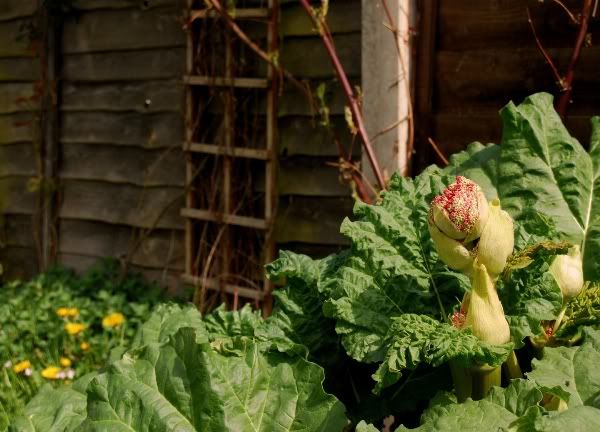
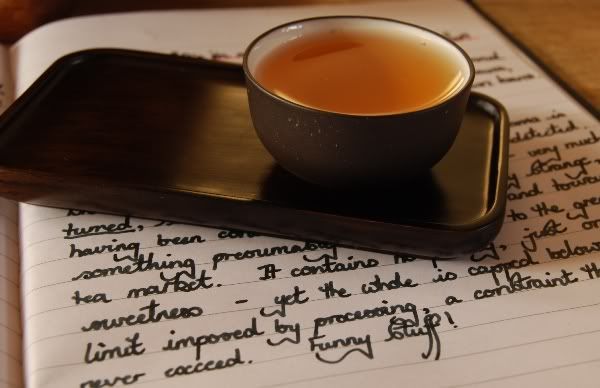

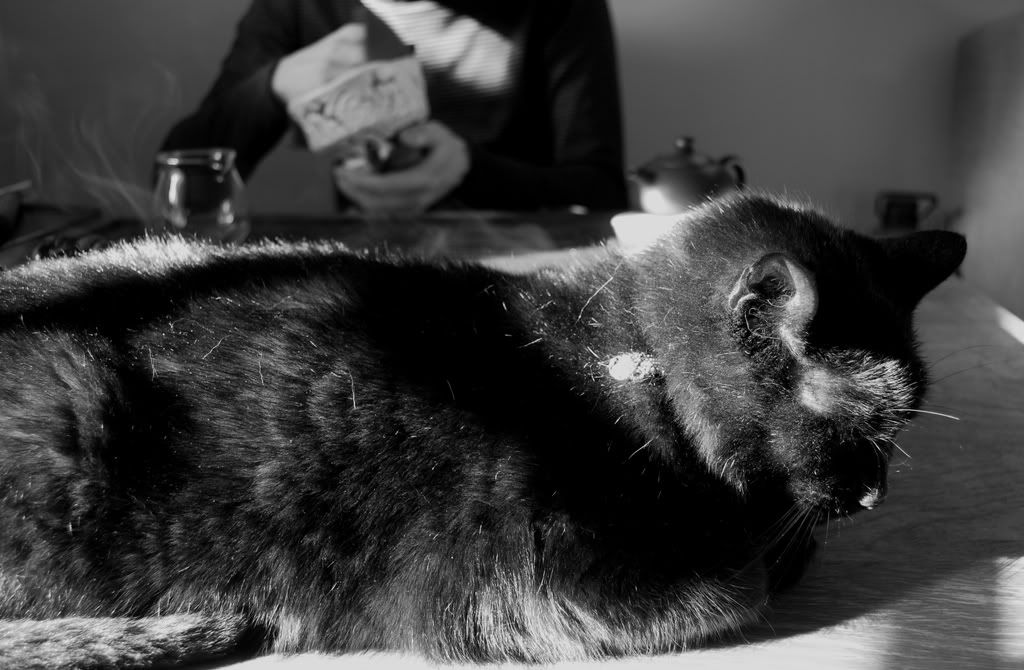
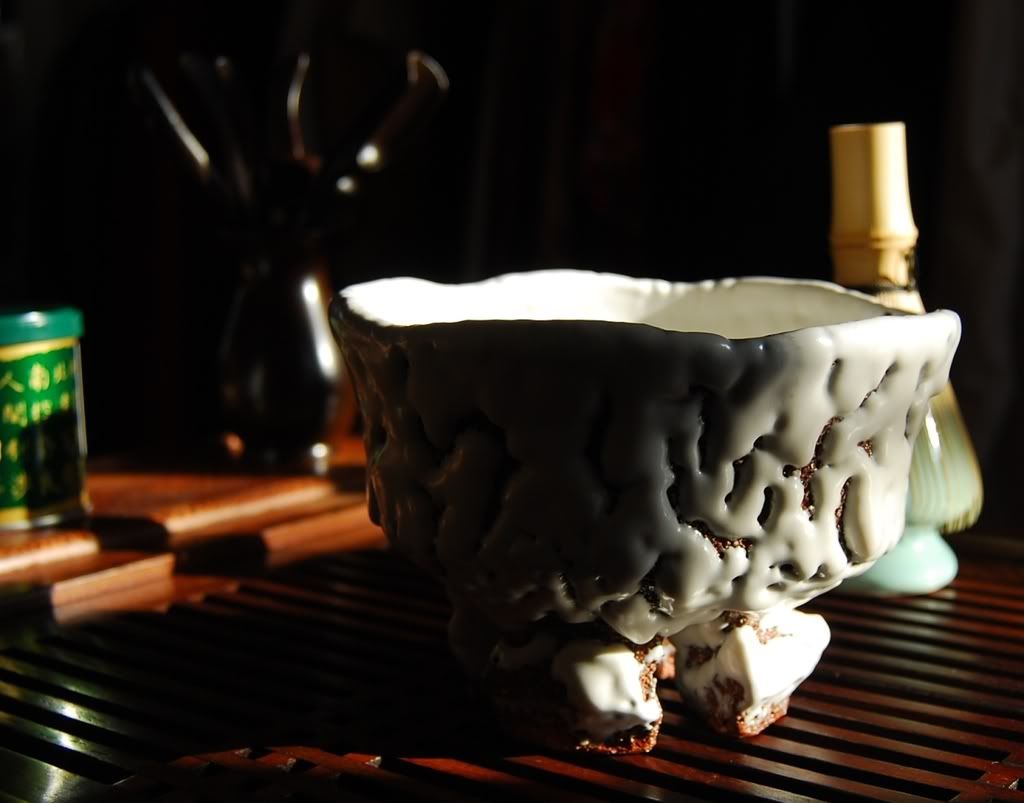


12 comments:
How can we, rabid tea blog chasers, not be charmed and salivating for the next installment of this post. Self deprecating aside, your honesty is laudable, the photography is mesmerizing and the tea education…it’s why we are here. Love the brackets!
Charles
Great post (and yes, I would be saying that even if you hadn't linked to me ;D )! Witty as always, especially the Buddhist bodyguard joke, haha.
I also don't like telling people about my blog. Even when others aren't faking interest, they ask if you are a sort of "connoisseur" and things just get awkward, as you noted.
In the few wine tastings I've done in Sonoma (right next to Napa), I have rarely seen people spitting. I'm a little surprised by your brother's ejection though, considering the general laxity of Californian etiquette. :)
Again, great post! I look forward to the next one.
Brent
As an amateur Gonfucha giver, myself and Tai Chi students, enjoy the flavor more after using the weniangbei. So, like you said the weniangbei helps dissipate the heat allowing the tea notes to push through from the cup. (What is the name for the “cup”.)
Rhubarb blooms are so alien-looking. I've got some in the garden here too. Yes, great post; it lifted my spirits today when I was surfing for a good read. Looking forward to part II. My spirits needed a lift today because our contractor bailed out on us, so no house this year. On the up side, I inventoried my tea collection over the weekend. On the down side, this confirms that I should not buy more tea for storage. Tea purchases will be limited to small quantities for tasting. (Unless, of course, that leads to finding something I just can't live without...)
"I can certainly see you know your wine. Most of the guests who stay here wouldn't know the difference between Bordeaux and Claret."
Basil Fawlty
I like how you are implicitly picking up on the tendency of a newbie to approach something like this as a 'technique'. Just looking at the word itself, 'proper' way to 'enjoy' something really force things into quotes.
Hooray for fourier domains, especially seeing how audiophiles turn music into intensity graphs described with wine-tasting terms. And you'd think the tea-lingo is crazy.
lovely musings; couldn't agree more; there are so many ways to drink tea! i've been reading a lot of tea blogs lately, and putting them together in a bloglist; which has grown; very long. the blogs are from many countries and in many languages, and really show how diverse the tea-drinking world. TEA ENTREPOT http://tea-blogs.blogspot.com/
-justin
I'll admit myself that I feel a bit silly when I talk about tea to co-workers, and when I get my tea set together, brew something in the kyusu, have multiple infusions and share it with my husband. He loves tea too...but sometimes I feel like i'm being...I don't know, lame? That may not be the right word. In the end though, I love tea, and everything about tea...and it gets me through the day.
What a lovely post!
I blog about tea mainly out of self-defense: People wanted to hear about the teas that I mentioned in my social media status updates. But yes, I do sometimes feel silly writing about that which is really a matter of personal preference.
But I think your tea-tasting suggestions are brilliant, and will be passing them on to others.
It seems that I, one who is usually described as a bit weird, stand rather alone in having no problem talking and telling others about my tea habits. I do, because it invariably comes up, recognize myself as a "connoisseur" but always with the disclaimer that I am no expert. A little Pompous? I am not sure. The dictionary's definition is "A person of informed and discriminating taste". I only agree to it because in comparison to the people asking the question, I am [more] knowledgeable [than they are]. I do not think of myself as an expert.
Although he may not like hearing it I think of Hobbes as quite the connoisseur (no quotes needed). The point is, I am proud of my hobby.
Dear all,
Many thanks for your comments - I've been out-of-town for a few days, and it was lovely to read them on my return.
Toodlepip,
Hobbes
Just found your blogs today. You have some great ones! I especially love your last couple on tasting tea. I will be watching, reading and learning from you for now on. Thanks for sharing your insight with us.
Post a Comment